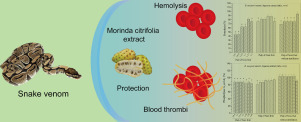Morinda citrifolia is a plant widely consumed as food and used in folk medicine. However, there is little scientific information regarding its therapeutic properties. In this study, aqueous extracts from the peel and pulp of M. citrifolia were characterized according to their modulatory action on phospholipases A2 and proteases (involved in hemostasis and inflammation). Bothrops moojeni venom was used for prospecting the effects of extracts on the human organism since there is high homology between the venom and human enzymes. The aqueous extracts pre-incubated with the venom significantly inhibited (12 to 16%) the phospholipase activity, in the different doses evaluated. M. citrifolia aqueous extract obtained from the peel and pulp (obtained without distillation) completely inhibited the venom-induced hemolytic activity. In contrast, the pulp extract (with distillation) reduced the activity up to 37.5%. The peel extract of M. citrifolia significantly inhibited the caseinolytic activity induced by proteases present in the venom (37% up to 56%). The pulp extract (obtained without distillation) inhibited approximately 50% of the thrombolysis induced by hemorrhagic proteases. The inhibition of phospholipases A2, proteases, and lysis of erythrocytes exerted by the extracts demonstrate their anti-inflammatory potential. They also have effects on blood coagulation, platelet aggregation and others processes related to the pathophysiology of hemostasis. Further studies are needed to confirm their potential use as a nutraceutical with preventive activity in inflammatory diseases and disorders of hemostasis.



